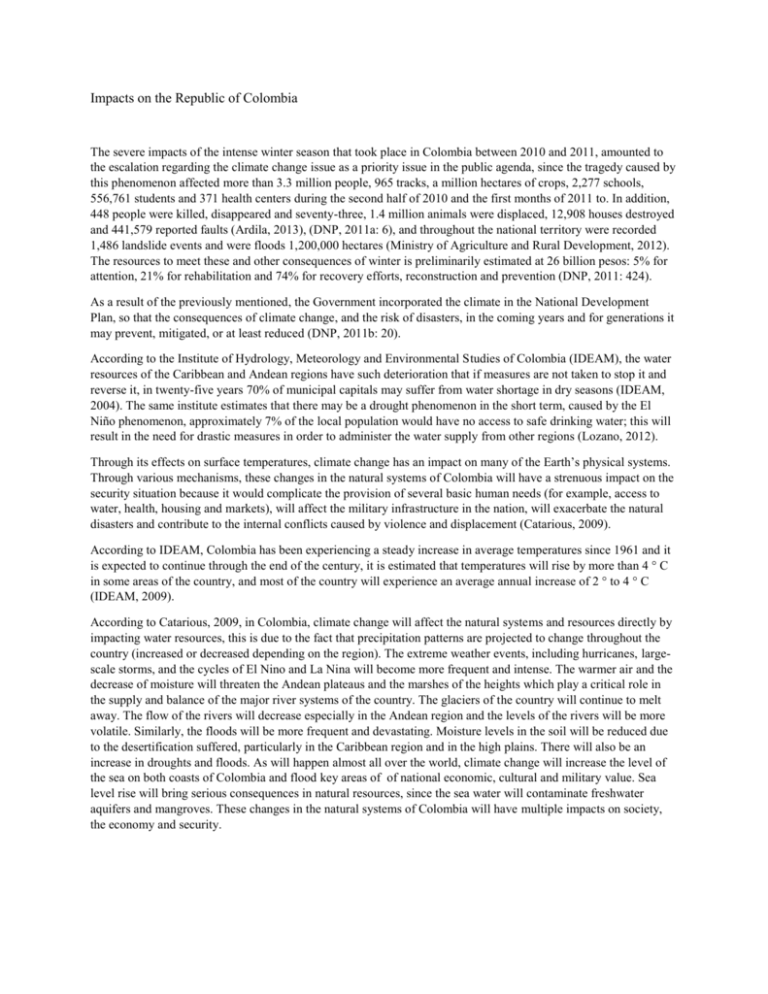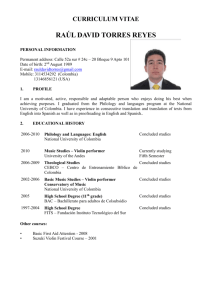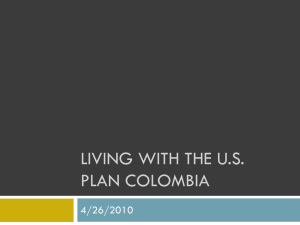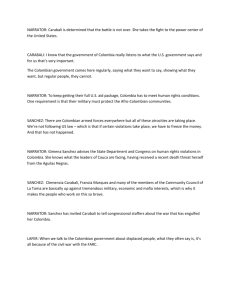Impacts on the Republic of Colombia
advertisement

Impacts on the Republic of Colombia The severe impacts of the intense winter season that took place in Colombia between 2010 and 2011, amounted to the escalation regarding the climate change issue as a priority issue in the public agenda, since the tragedy caused by this phenomenon affected more than 3.3 million people, 965 tracks, a million hectares of crops, 2,277 schools, 556,761 students and 371 health centers during the second half of 2010 and the first months of 2011 to. In addition, 448 people were killed, disappeared and seventy-three, 1.4 million animals were displaced, 12,908 houses destroyed and 441,579 reported faults (Ardila, 2013), (DNP, 2011a: 6), and throughout the national territory were recorded 1,486 landslide events and were floods 1,200,000 hectares (Ministry of Agriculture and Rural Development, 2012). The resources to meet these and other consequences of winter is preliminarily estimated at 26 billion pesos: 5% for attention, 21% for rehabilitation and 74% for recovery efforts, reconstruction and prevention (DNP, 2011: 424). As a result of the previously mentioned, the Government incorporated the climate in the National Development Plan, so that the consequences of climate change, and the risk of disasters, in the coming years and for generations it may prevent, mitigated, or at least reduced (DNP, 2011b: 20). According to the Institute of Hydrology, Meteorology and Environmental Studies of Colombia (IDEAM), the water resources of the Caribbean and Andean regions have such deterioration that if measures are not taken to stop it and reverse it, in twenty-five years 70% of municipal capitals may suffer from water shortage in dry seasons (IDEAM, 2004). The same institute estimates that there may be a drought phenomenon in the short term, caused by the El Niño phenomenon, approximately 7% of the local population would have no access to safe drinking water; this will result in the need for drastic measures in order to administer the water supply from other regions (Lozano, 2012). Through its effects on surface temperatures, climate change has an impact on many of the Earth’s physical systems. Through various mechanisms, these changes in the natural systems of Colombia will have a strenuous impact on the security situation because it would complicate the provision of several basic human needs (for example, access to water, health, housing and markets), will affect the military infrastructure in the nation, will exacerbate the natural disasters and contribute to the internal conflicts caused by violence and displacement (Catarious, 2009). According to IDEAM, Colombia has been experiencing a steady increase in average temperatures since 1961 and it is expected to continue through the end of the century, it is estimated that temperatures will rise by more than 4 ° C in some areas of the country, and most of the country will experience an average annual increase of 2 ° to 4 ° C (IDEAM, 2009). According to Catarious, 2009, in Colombia, climate change will affect the natural systems and resources directly by impacting water resources, this is due to the fact that precipitation patterns are projected to change throughout the country (increased or decreased depending on the region). The extreme weather events, including hurricanes, largescale storms, and the cycles of El Nino and La Nina will become more frequent and intense. The warmer air and the decrease of moisture will threaten the Andean plateaus and the marshes of the heights which play a critical role in the supply and balance of the major river systems of the country. The glaciers of the country will continue to melt away. The flow of the rivers will decrease especially in the Andean region and the levels of the rivers will be more volatile. Similarly, the floods will be more frequent and devastating. Moisture levels in the soil will be reduced due to the desertification suffered, particularly in the Caribbean region and in the high plains. There will also be an increase in droughts and floods. As will happen almost all over the world, climate change will increase the level of the sea on both coasts of Colombia and flood key areas of of national economic, cultural and military value. Sea level rise will bring serious consequences in natural resources, since the sea water will contaminate freshwater aquifers and mangroves. These changes in the natural systems of Colombia will have multiple impacts on society, the economy and security. Colombian Military Forces In Colombia the climate change will act as a threat multiplier, which will only exacerbate the problems that already exist (for example, drug trafficking and crime, natural disasters, migration or forced displacement) and will require skills and resources of the government, communities and the forces that guard the security to be able to respond to these and other threats. National security challenges will come about through several factors, among which can be included, the increase in the frequency and intensity of natural disasters (floods, droughts, forest fires and (on the Caribbean coast) tropical storms. These impacts will overlap and potentially have a serious humanitarian and economic effect. The creation of such conditions that would facilitate illegal activities, which will exacerbate the crime and violence at the national level. The illegal armed groups and criminal organizations will benefit from the disorders caused by climate change and social unrest. There will be some advantages due to the relative flexibility of its operations against the government and the military forces, who will have to address the impacts of climate on the infrastructure and the diversion of resources. The increase of human displacement (climate change may cause displacement, both at a national and international scale, due to the increase of natural disasters, and environmental and social impacts). Increased pressure on military resources and operations (the Colombian military must adapt its facilities and operations to climate change, in order to be able to, to ensure the security. It is very likely that the Mission of the armed forces will be affected by floods along the river system since many military installations in Colombia are located along the banks of the rivers. On the other hand because the increase in the projected sea-level, military units located along Colombian coastal areas will be affected. Therefore, the damage to infrastructure and the greater complexity of the humanitarian missions will be significantly affect the armed forces in the use of earmarked resources for other missions and operations (Catarious, 2009). REFERENCES Gerardo, Ardila., Germán, Andrade., Juan, Benavides., Julio, Carrizosa., Jason, García., Manuel, Rodríguez., Guillermo, Rudas. y Juan Pablo, Ruiz. (2013). “Desarrollo económico y adaptación al cambio climático”. Colombia: Editorial Martha Cárdenas y Manuel Rodríguez. Departamento Nacional de Planeación DNP. 2011a. “Bases del Plan nacional de desarrollo 2010- 2014, Prosperidad para todos”. DNP. Bogotá. Citado por Ardila, 2013. Ministerio de Agricultura y Desarrollo Rural. 2012. Boletín de prensa 038. 9 de febrero. Diez grandes logros destaca Minagricultura en la rendición de cuentas 2010-2011. Bogotá. Citado por Ardila, 2013. 2011b. “Conpes 3700. Estrategia institucional para la articulación de políticas y acciones en materia de cambio climático en Colombia”. Consejo Nacional de Política Económica y Social. República de Colombia. Departamento Nacional de Planeación. Bogotá. Citado por Ardila, 2013. Ideam. 2004. “Informe anual sobre el estado del medio ambiente y los recursos naturales renovables en Colombia”. Ideam. Bogotá.). Citado por Ardila, 2013. Lozano, Ricardo. 2012. Entrevista con Ricardo Lozano, director del Ideam. 29 de abril, realizada por Manuel Rodríguez y Jason García.) (Ardila,2013). Citado por Ardila, 2013. Catarious, David M. Espach, Ralph H. “Impactos del Cambio Climático en la Seguridad Nacional y Regional de Colombia”. CNA, 2009). Interview with officials at IDEAM, Bogotá, Colombia. 09 Jun 2009. Citado por Catarious, 2009.






